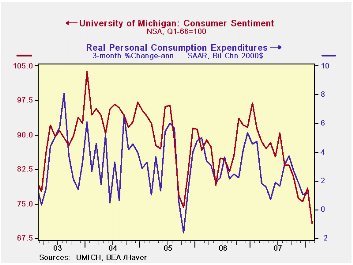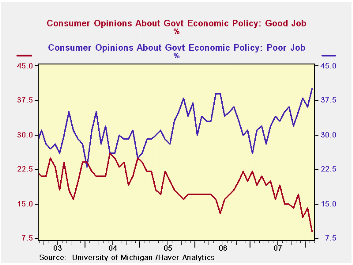 Global| Feb 29 2008
Global| Feb 29 2008Michigan Consumer Sentiment Lowered By A Foul Opinion of Government
by:Tom Moeller
|in:Economy in Brief
Summary
For all of February the University of Michigan's consumer sentiment index fell just 9.7% to a level of 70.8. That decline was a little better than the 11.2% plunge from January reported at mid-month. It also was better than the [...]

For all of February the University of Michigan's consumer sentiment index fell just 9.7% to a level of 70.8. That decline was a little better than the 11.2% plunge from January reported at mid-month. It also was better than the reading of 70 that had been generally expected. Nevertheless, it was the largest m/m decline since 2005 and it was to the lowest level since early 1992.
Opinions about government policy continued down sharply. The 11.5% m/m (-21.6% y/y) decline was deeper than initially indicated and dropped the measure of opinions to the lowest level since 1993. Just 9% of those surveyed indicated that they thought government was doing a good job and 40% indicated that a bad job was being done.
The index of expected business conditions during the next year improved very slightly from the preliminary reading but it still fell a hard 8.4% m/m, to its lowest level since just after the recession of 1990. Expectations for business conditions during the next five years fell 5.7% (-15.3% y/y) while expectations for personal finances reversed all of a January increase and fell 3.4%.
The current conditions index fell a bit more than initially indicated. The 11.2% m/m drop was to the lowest level since 1992. Current conditions for buying large household goods continued down 15.8% m/m to the lowest level since 1992. The view of current personal finances also fell 4.1% (-21.0% y/y).
Expectations for inflation during the next twelve months fell just slightly to 3.9% but that still was up from a 3.6% expectation in February '07. For the next five to ten years expectations held steady at 3.4%.
The University of Michigan survey is not seasonally adjusted.The reading is based on telephone interviews with about 500 households at month-end; the mid-month results are based on about 300 interviews. The summary indexes are in Haver's USECON database, with details in the proprietary UMSCA database.
The Reaction of Consumer Spending and Debt to Tax Rebates – Evidence from Consumer Credit Data from the Federal Reserve Bank of Chicago can be found here.
| University of Michigan | Feb (Final) | Feb (Prelim. | Jan | Dec | Feb y/y | 2007 | 2006 | 2005 |
|---|---|---|---|---|---|---|---|---|
| Consumer Sentiment | 70.8 | 69.6 | 78.4 | 75.5 | -22.5% | 85.6 | 87.3 | 88.5 |
| Current Conditions | 83.8 | 85.4 | 94.4 | 91.0 | -21.5% | 101.2 | 105.1 | 105.9 |
| Expectations | 62.4 | 59.4 | 68.1 | 65.6 | -23.4% | 75.6 | 75.9 | 77.4 |
Tom Moeller
AuthorMore in Author Profile »Prior to joining Haver Analytics in 2000, Mr. Moeller worked as the Economist at Chancellor Capital Management from 1985 to 1999. There, he developed comprehensive economic forecasts and interpreted economic data for equity and fixed income portfolio managers. Also at Chancellor, Mr. Moeller worked as an equity analyst and was responsible for researching and rating companies in the economically sensitive automobile and housing industries for investment in Chancellor’s equity portfolio. Prior to joining Chancellor, Mr. Moeller was an Economist at Citibank from 1979 to 1984. He also analyzed pricing behavior in the metals industry for the Council on Wage and Price Stability in Washington, D.C. In 1999, Mr. Moeller received the award for most accurate forecast from the Forecasters' Club of New York. From 1990 to 1992 he was President of the New York Association for Business Economists. Mr. Moeller earned an M.B.A. in Finance from Fordham University, where he graduated in 1987. He holds a Bachelor of Arts in Economics from George Washington University.
More Economy in Brief
 Global| Feb 05 2026
Global| Feb 05 2026Charts of the Week: Balanced Policy, Resilient Data and AI Narratives
by:Andrew Cates






